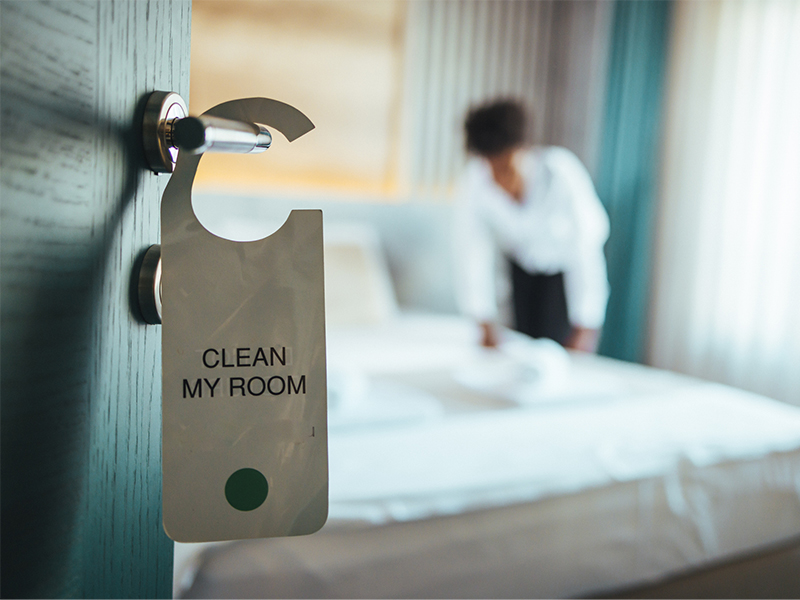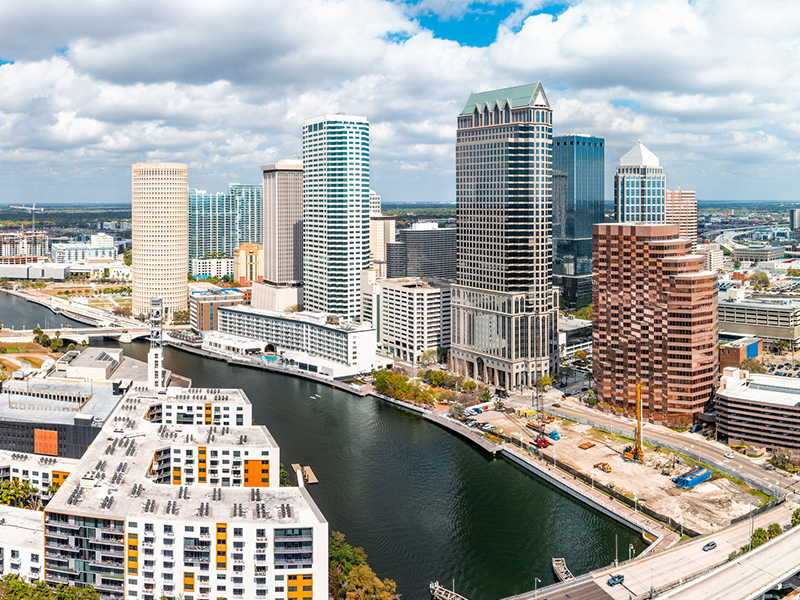Tampa, Florida has always been a hot tourist destination, and its hotels have traditionally seen some of the highest occupancy rates in the country. This was true even during the pandemic, but post-pandemic, the city is geared to welcome ever-greater numbers to enjoy all the city has to offer.
For those looking to buy into the hospitality and hotel market in Tampa, there is a lucrative opportunity. This also presents a fantastic opportunity for those looking to sell. This guide will show you how to sell a hotel in Tampa for the best return on investment and in the quickest time. We’ll delve into the most important factors, some of which are not so obvious, to set you on the right path to success, and make your sale the springboard to future ventures.
Table of Contents
The Hotel Market of Tampa, FL
Think of a visit to Florida, and many might immediately think of Miami or Orlando with the obvious attractions of Disneyland or the Epcot Center. However, in the 2022-2023 fiscal year Tampa Bay attracted almost 27 million visitors, nearly 10% more than the year previous. Demand for temporary accommodation in Tampa is growing at a rapid pace.
Tampa Bay’s popularity as a tourist destination can be credited to its beautiful beaches, cultural attractions, and vibrant nightlife. The city hosts major events and sports games which attract a steady flow of visitors throughout the year. Tampa has also seen a massive increase in the number of conventions that it holds, all of them needing accommodation and hospitality for their attendants.

All these factors combine to make hotels a prime business in the area, putting sellers in a great position to take advantage.
Preparing For Your Hotel Sale
The first task in how to sell a hotel is finding out what your hotel is worth. This will include a considerable amount of paperwork, inventorying, and calculation. Once you have all your documents you’ll have to go further and evaluate certain intangible factors that can add value.
Tangible Value
Start with figuring out how much your hotel is worth on a tangible level. This means taking a raw account of all the things in the hotel including the hotel building and the land if you own it.
- Evaluate the Value of the Property
- Conduct an Inventory of All the Hotel’s Assets
- Show Revenue and Expenditure
- Debt
To get the most accurate calculation of the value of the property, it is advisable to have a comparative valuation of other similar properties in the market. This is a similar report to a Comparative Market Analysis (CMA) created by real state agents for clients looking to sell their homes. It is important to compare like for like, as a 3-star hotel cannot be compared to a 5-star one. That would be similar to comparing a multi-million luxury home to a standard one.
This will include all the equipment, furniture, bedding, and anything else within the hotel that is of value. Hotels are likely to have specialized equipment in kitchens that allow for greater production, they’ll have numerous chairs and tables, beds, and possibly high-end washing machines to clean all those sheets and towels a hotel uses. There may even be art pieces displayed throughout the hotel. All these have to be itemized and valued.
How much does your hotel bring in within a certain period? You’ll need to be able to provide information to prospective buyers about the profitability of the hotel. You should be able to show records of average occupancy on an annual and even monthly basis and how much expenditure there was within the same period of time.
It may be the case that these numbers do not make favorable reading if the hotel has not performed well, however, it is crucial that the information is as accurate as possible, and that the seller is fully transparent. Any information that can be reasonably argued as an inflation of the hotel’s performance can result in soured relations not only with one potential buyer but the buying market as a whole. It may even lead to legal repercussions.
Bear in mind that the hotel’s performance need not be stellar for a seller to sell at a good price. Buyers will often understand that there are a multitude of reasons for selling and it is often the case that they will have some desire to renovate or in some way make the hotel run in a way they desire. That being said, if your hotel is doing well, you can place a higher premium on the price.
It may be that the hotel is still mortgaged to a lender in which case you will receive the equity that has built up on the hotel with the rest being paid back to the lender.
Intangible Value

Then there are intangible factors that affect the value of the property. These factors are not as objectively certain as tangible assets, and the value they provide lies in a much grayer area, however, they should not be discounted. Some of these factors include:
- Branding and Reputation
- Repeat Business and Customer Loyalty
Your hotel may be associated with a national brand, and if not, it may have a great reputation having provided service for many years. While this should translate to a more tangible effect on your record books, just a great reputation or known branding can add to the value.
If the building has a historical or cultural significance or is placed near a notable landmark, this may also add value. It may be that your hotel is known for being able to host conventions or events. Having a specialty or providing niche services differentiates you from other hotels which can be leveraged when assessing value.
This factor is considered intangible because it is still potential revenue. While you can expect loyal customers to return, it is not guaranteed. Still, continued repeat business from loyal clients can be taken into account when coming up with a valuation of the hotel.
Getting the most accurate evaluation of your hotel will require taking into account both tangible and intangible factors. There’s a lot to consider and do, so we advise working with a commercial real estate professional to provide you with the most accurate figure.
Preparing Your Hotel
Before putting your hotel up for sale, you’ll want to make sure you can showcase it at its best. This may seem obvious, but there are occasions when a hotel owner may have become weary and tired of the business. This can lead to an approach where the hotel owner neglects to properly invest the time and money to make the improvements needed. This would be a mistake as often with hotels, it’s the small details that make a big difference to how the hotel is perceived and the price it can command.
- Make Minor Repairs
- Prepare Your Staff
- Be Wary of Major Improvements
A broken fixing, a torn rug, or chipped walls are all unsightly and lower the aesthetic appeal of a property. Having a prospective buyer view the hotel and notice disrepair will only remind them of the work they will need to do. Minor issues are quick and inexpensive to fix and leave a positive impression on buyers.
If your hotel is operational and you have staff, prepare them for a viewing. While you would always expect your staff to be professional and welcoming, you’ll want to make sure that during a visit, they are at their best. It may be helpful to remind staff that ownership change is not necessarily a threat to their jobs. In fact, most hotel buyers would appreciate changing as little as possible, and if they see great staff, they are likely to just want to retain them.
When selling your hotel, you may be tempted to invest in upgrades and modifications in the hope of raising the asking price. However, not all upgrades will help secure a good return on investment, some may even leave you out of pocket. It’s important to remember that different buyers are likely to have different visions of how they want the hotel to run. Some may even want to transform the hotel into another type of commercial building.
Again, we would recommend working with a commercial real estate agent in order to know what are the best upgrades for your particular area in Tampa.
Marketing Your Hotel Effectively
Once you have all your documentation in order, and have a competitive price for the hotel, you’re ready to put the hotel on the market. Marketing can be an expansive venture on its own.
How to sell a hotel will depend on what kind of hotel it is. You’ll need to not only make your hotel visible online but distinguishable from competitors. This will involve utilizing different online platforms. Posting on Facebook will give you a wide reach but will it be aimed at your target audience? Posting on LinkedIn may be a good option as it caters well to business-to-business interactions. There is no real reason why you shouldn’t use multiple platforms and indeed, this is recommended. Be prepared to create literature and post to various social media platforms, business and trade magazines, travel publications, and other industry-related publications.
Remember that Tampa has a large business community and getting the word out effectively to just a few members of the right audience can cause a cascading effect that will ripple through the community.
The more online presence you have with quality content that matches and appeals to your targeted audience, the more interest you generate. This will go a long way in bringing in leads and potentially higher bids on your hotel.
However, there are a few considerations that some hotel owners forget when they think about how to sell a hotel. Here are some points to keep in mind.
- Be Ready to Give a Reason to Why You Are Selling
- Show an Efficient Working System
- Partner with Commercial Real Estate Agent
- A network of buyers and sellers.
- A network of industry-related professionals, such as lawyers and builders.
- Years of experience buying and selling similar properties.
- Honed negotiation skills acquired in the field.
- Advanced marketing strategies.
- The time needed to sell your property.
Unlike buying a home, a prospective buyer will be more interested in why you are selling a business. If the business is profitable, they’ll want to know why you are leaving it. If the business is not, they’ll want to know more about why it is not.
In either case, it’s best to be upfront about your experience with the hotel while still providing as much room for the buyer to imagine how they would run the business and make it their own success story.
While a buyer may want to put their own stamp on their new acquisition, many appreciate buying a hotel that’s already well run. The less they have to do in terms of ensuring efficient systems and management, the more they can concentrate on rebranding and marketing to new clients and customers.
Having owned a business, many sellers may be inclined to try and save on expenses and sell the property themselves. This is possible but unlikely to gain you the optimum return on your investment, in the best possible time.
A commercial real estate agent has:
Another overlooked benefit is that an agent will be a reliable objective source of invaluable information and guidance. If you’ve spent years, maybe most of your working life investing your time, money, and passion into a hotel, it can be difficult to distinguish between what is its market value and the value you have given to it.
A professional agent will bring out the best of your efforts to the market, and highlight the care and work that has gone into the establishment. This can be a valuable component of a marketing campaign. They will also be a strong source of support in what can often be an emotional time.
Advanced Marketing: Addressing Hotel Owner Challenges

All hotels face one basic fundamental challenge: Keeping occupancy as high as possible throughout the year. This is true today as it has always been but now there is a new challenge for hotel owners in Tampa Bay. The growing success of the tourism industry in Tampa has meant that occupancy is less of a challenge than the retention and employment of high-quality staff. As a hotel owner, there is a balance between keeping and attracting the best employees and ensuring that your business stays profitable.
Having a qualified staff that will be an asset to your hotel will be helped by the fact that Florida is set to continually increase minimum pay consecutively until 2028. In 2023 and 2024 the minimum wage and tipped wage were increased to provide better conditions for workers. The table below shows the incremental rise in these rates till 2028.
These increases should present a relatively minor challenge to hotel owners since as we have seen, tourism in Tampa is booming and the increased revenue from more guests should more than offset the increased rates paid to staff.
When marketing your hotel you can:
- Inform the client of the challenges you have faced as a hotel owner
- Show them the measures taken to address those challenges
- Reassure them of any concerns they may have about their venture
Informing potential hotel buyers of an issue they may not have considered is a powerful technique. Showing them that retaining and attracting qualified staff is being addressed by both the local government and your own initiatives will help them see that your interest is not just the quick sale of the hotel. It will show them that you are interested in their success and are looking to assist them beyond the close of the deal. This can be done for any challenge you have faced as a hotel owner.
Closing the Deal
Before the deal is closed, the sale must pass compliance laws in Tampa, Florida. These are relatively straightforward in most cases but can include health and safety, liquor licenses, employment laws, and possible zoning regulations among others. It is highly recommended that you have a lawyer with you to ensure that the sale is compliant with any pertinent laws.
When you have accepted a bid, then it’s time to start disassociating yourself or clearing any contractual obligations. These may include agreements and contracts with vendors and brand associations with charities. It may be the case that these agreements and terms are to be carried over to the new owners, and this can be stipulated within the sale contract.
A nice touch is to introduce the staff to the new owners. This will go a long way to making people who have worked for you feel appreciated and remembered.
Sell Your Hotel in Tampa with Our Expert Assistance
If you’re in the position of wanting to sell your hotel in Tampa, Florida, the market is promising. The growth of the tourism industry has seen a growth in the demand for commercial property for sale in Florida.
Take advantage of the experience and expertise of The Goldman Group headed by Rachel Goldman who brings a wealth of know-how being both an entrepreneur and deeply connected as a commercial realtor.
Reach out to us at 813.810.2829 or leave a message here and we’ll show you how to sell your hotel helping you through every part of the process. We also believe that as one door closes others open. Let’s explore them together.

